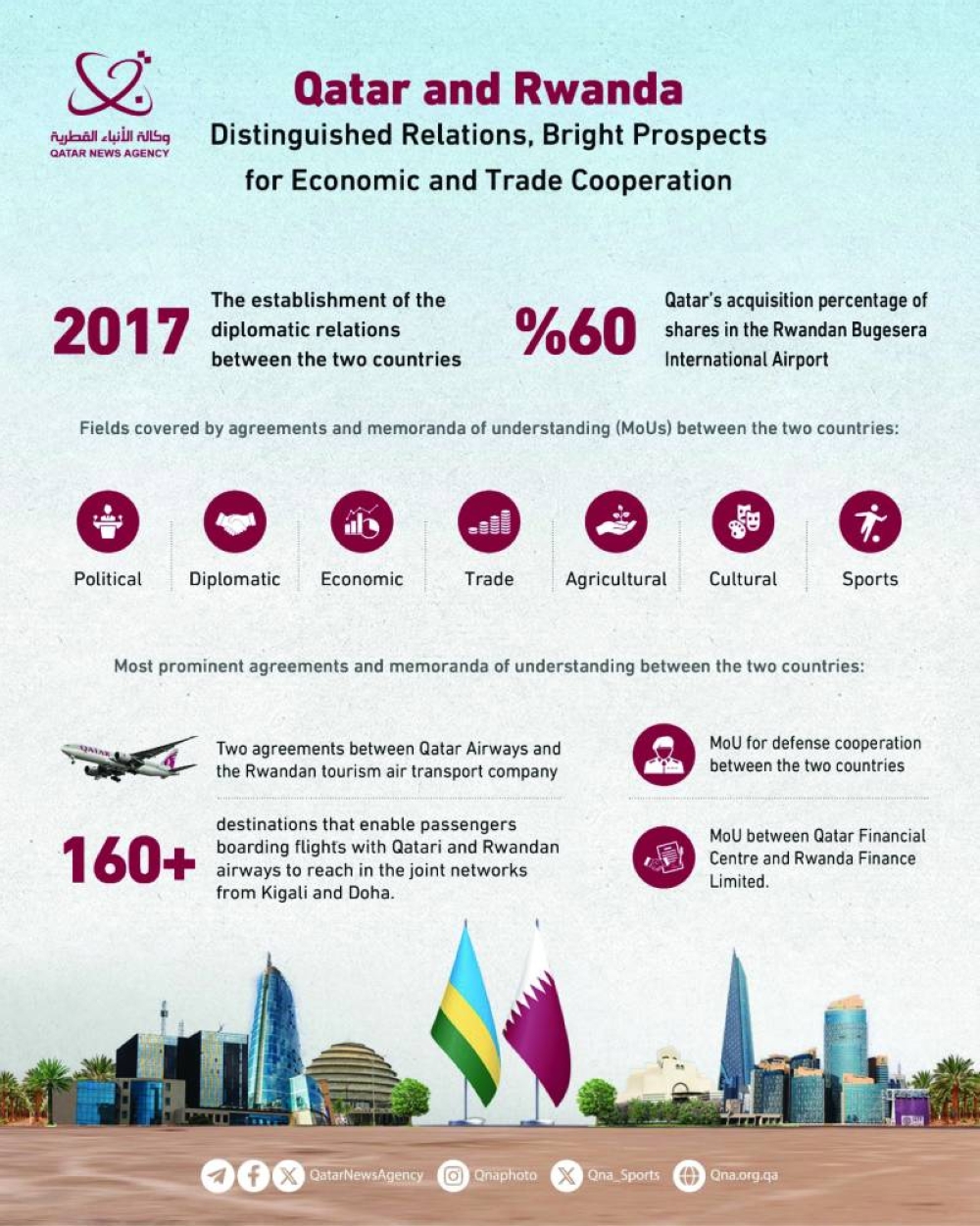Qatar and Rwanda maintain robust and exceptional ties that reflect the desire of the leaderships of the two nations to strengthen them in wide-ranging fields for the best interest of the two friendly countries and peoples.
Qatar pursues the policy of openness and co-operation in engaging with various sisterly nations and friendly peoples, including the African nations that share rock-solid strategic ties with the State, based on mutual respect, co-operation and solidarity toward African and global issues. It seeks to advance its investment programmes, in pursuit of serving the common interest with many sisterly and friendly countries in general.
The relationship is burgeoning and is termed as ambitious and promising, with the two nations consistently working to build a role model partnership and collaborating on numerous issues to serve their interests and those of other nations, with Qatar being a strategic partner to Rwanda.
Bilateral ties have been steadily growing since the establishment of their diplomatic relations in 2017, and since then, leaders of the two countries have been regularly meeting, and their high-profile mutual visits at the levels of ministers and various delegations gave impetus to the co-operation in many critical fields that fostered bilateral partnership.
The two countries are connected with a plethora of agreements and memorandums of understanding (MoUs) covering political, diplomatic, economic, trade, agricultural, cultural, sports, as well as investment and co-operation sectors in the area of aviation and double taxation avoidance.
In addition, the two countries signed an agreement to acquire 60% of the share of the Rwandan Bugesera International Airport, with Qatar Airways signing two agreements with the Rwandan tourism air transport company and one agreement with the Aviation, Travel and Logistics Holding Limited in Rwanda, along with an MoU for defence co-operation.
Hassad, Qatar’s premier investor in food sector, also signed an MoU with the Rwandan government for broadening the co-operation opportunities and studying investment opportunities in food and agricultural fields.
Furthermore, Qatar Financial Centre (QFC) inked an MoU with Rwanda Finance Limited (RFL) to facilitate initiatives that will promote the international development of both QFC and Kigali International Financial Centre. Under this MoU, the two parties intend to encourage their respective regulatory authorities to enter mutual recognition agreements to open new business opportunities in both markets.
This MoU marks the long-term co-operation between QFC and Rwanda Finance Limited to support businesses in Rwanda and Qatar through joint initiatives that foster skills development, knowledge exchange and investment and partnership opportunities. The agreement also takes QFC a step further in its efforts to forging durable partnerships with international markets that help support Qatar’s economic diversification and capacity building drive.
The signed agreements between the two countries comprise an agreement that enables passengers boarding flights with Qatari and Rwandan airways to reach over 160 destinations in the joint networks from Kigali and Doha.
On the margins of the ICAO Air Services Negotiation (ICAN2023) held in Riyadh, Saudi Arabia in December 2023, the Qatar Civil Aviation Authority held bilateral discussions with the Rwandan counterpart which came up with positive outcomes, culminating in signing an MoU that allows both air carriers to enter into trade cooperation agreements.
Rwandan President Paul Kagame so far expressed his country’s desire to foster its economic and partnership with Qatar, highlighting that the path of development in Qatar is a role model. He emphasised that there is a significant opportunity to advance economic and trade co-operation with Qatar, with Rwanda positioning itself as one of the fastest growing economies in Africa.
By and large, Rwanda offers a growing and stable investment system in industries, such as such as textiles, apparel, leather, agriculture, livestock, industry, tourism, information and communications technology, and pharmaceuticals, along with significant contributions from the services sector to the Gross Domestic product (GDP), the president said.
Kagame emphasised that his country possesses numerous investment advantages, but it should draw on its own efforts to achieve its aspirations by pursuing a new mindset and engaging in diligent and persistent work.
Rwanda is located in the heart of Africa, south of the equator, within the Great Lakes Plateau. It is a landlocked nation with no coastline, connecting to the outside world through neighboring countries, particularly via the ports of Dar es Salaam in Tanzania and Mombasa in Kenya.
The country spans over 26,000 sq km and has an estimated population of 12mn, with 83% residing in rural areas.
In the early 1990s, Rwanda experienced one of the most brutal ethnic conflicts in history. However, it has managed to recover and rebuild itself into a unified, prosperous nation, filled with hope, success, and competitiveness both regionally and globally.
Rwanda’s success story exemplifies the potential for transformation. Once a small, impoverished nation, it has achieved considerable progress, transitioning from an agrarian economy to one focused on technology, knowledge, and services. The country has fostered foreign investment by reducing barriers, offering incentives, and opening all sectors to international investors.
With their clean and sophistication, streets in Rwanda resemble most streets of the European capitals as visitors cant be oblivious to the landmarks of the economic boom the nation witnesses. It is known as the land of a thousand hills and draws tourists from different territories around the globe thanks to the rare and tantalising natural landscape. (QNA)

